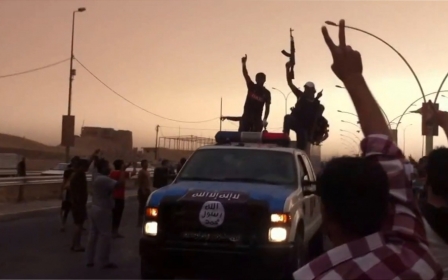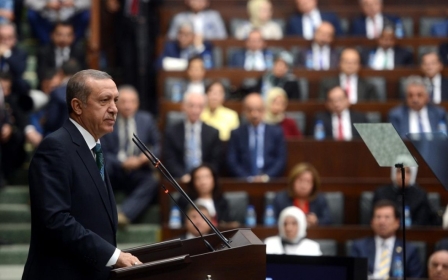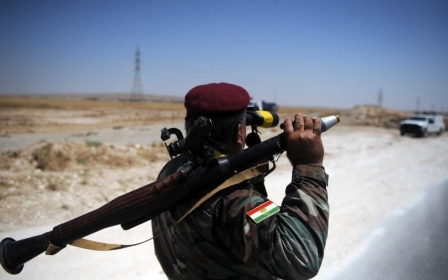Iraq PM sacks top officers as militants continue onslaught

Iraqi Prime Minister Nuri al-Maliki dismissed several senior security force officers Tuesday, including the top commander for Nineveh province in the north, the first to fall in the offensive.
Maliki also ordered that one of the officers he fired face court-martial for desertion.
The swift advance of the militants has sparked international alarm, with UN envoy to Baghdad Nickolay Mladenov warning that Iraq's territorial integrity was at stake.
"Right now, it's life-threatening for Iraq but it poses a serious danger to the region," Mladenov told AFP. "Iraq faces the biggest threat to its sovereignty and territorial integrity" in years.
A series of bombings in Baghdad and army shelling in the Iraqi city of Fallujah killed 21 people on Tuesday.
The violence came during a major offensive, spearheaded by the Islamic State of Iraq and the Levant (ISIL) but involving other groups, which overran all of one province and chunks of three more in a matter of days.
In the deadliest single attack, a car bomb exploded in a market in the predominantly-Shiite Muslim area of north Baghdad, killing at least 11 people and wounding more than 20, security and medical officials said.
Five more bombings in the capital killed a further six people and wounded 14, officials said.
In Fallujah, a city west of Baghdad that has been held by anti-government fighters for more than five months, army shelling killed four people and wounded three, Dr Ahmed Shami said.
North of the capital, Iraqi police discovered the bodies of 18 security force members who had suffered gunshots to the head and chest.
Washington, which is mulling air strikes against the militants, has ruled out cooperating militarily with Tehran, but the two governments held "brief discussions" on the crisis in Vienna.
For its part, Iran denied on Tuesday that it had sent troops to Iraq but it said that it is ready to cooperate with the Iraqi government if needed and is following developments in Iraq closely.
Since the insurgents launched their lightning assault on June 9, they have captured Mosul, a city of two million people, and a big chunk of mainly Sunni Arab territory stretching south towards the capital.
More militant advances
Officials said on Tuesday that militants briefly held parts of the city of Baquba, just 60 kilometres (40 miles) from the capital.
They also took control of most of Tal Afar, a strategic Shiite-majority town between Mosul and the border with Syria.
Soldiers, police and armed residents held on to parts of Tal Afar's airport, the deputy head of the provincial council, Nureddin Qabalan, said.
Iraqi officials said that 70 ISIL fighters were killed in the eastern of province Diyala during the last 48 hours
Near Ramadi city in the western Anbar province, five ISIL militants were killed in clashes with Iraqi forces on Tuesday, reported a security source.
Further south, security personnel abandoned the Iraqi side of a key crossing on the border with Syria, officers said.
In ethnically mixed Kirkuk province, militants took control of Multaqa village, but were repelled by security forces in Bashir village.
The swift advance of the militants has sparked international alarm, with UN envoy to Baghdad Nickolay Mladenov warning that Iraq's territorial integrity was at stake.
"Right now, it's life-threatening for Iraq but it poses a serious danger to the region," Mladenov told AFP.
"Iraq faces the biggest threat to its sovereignty and territorial integrity" in years.
The violence has stoked regional tensions, with Iraq accusing neighbouring Saudi Arabia on Tuesday of "siding with terrorism" and of being responsible for financing the militants.
The comments came a day after the Sunni kingdom blamed "sectarian" policies by Iraq's Shiite-led government for triggering the unrest.
Sunni 'autonomous region'?
The prime minister of Iraq's autonomous Kurdish region told the BBC it would be "almost impossible" for the country to return to how it was before the offensive, and called for Sunni Arabs to be granted an autonomous region of their own.
Alarmed by the collapse of much of the security forces in the face of the militant advance, foreign governments have begun pulling out diplomatic staff.
Meanwhile, the US-based think tank the Brookings Institution's said in its June 14 'Iraq Military Situation Report' that ISIL is expected to continue to make some advances but are unlikely to overrun Baghdad.
Pointing out that Shiite troops would not fight and die for Sunni cities, the report says it was quite normal for Sunni militants to make rapid advances across primarily Sunni lands: "That’s because it is not surprising that the Iraqi Security Forces (ISF) would crumble in those areas."
Conquering Baghdad, however, is formidable because Shiite troops are more likely to find their courage when they are defending their homes and families in Baghdad, the report says.
It is underlined in the report that the Sunni militants in Iraq are a coalition, not a single group. That ISIL is an Iraqi entity, not a foreign group, is also emphasized in the report.
"Seeing them for what they are, first and foremost a sectarian militia waging a civil war, puts the emphasis on where it needs to be: finding an integrated political-military solution to the internal Iraqi problems that sparked the civil war. And that is a set of problems that is unlikely to be solved by immediate, direct American attacks on the Sunni militants. Indeed, such attacks could easily make the situation worse."
Meanwhile, UN Secretary-General Ban Ki-moon has urged the Iraqi government of Prime Minister Nouri al-Maliki to take an inclusive approach, while also calling on Turkey and Iran to help defuse the crisis.
Stay informed with MEE's newsletters
Sign up to get the latest alerts, insights and analysis, starting with Turkey Unpacked
Middle East Eye delivers independent and unrivalled coverage and analysis of the Middle East, North Africa and beyond. To learn more about republishing this content and the associated fees, please fill out this form. More about MEE can be found here.




